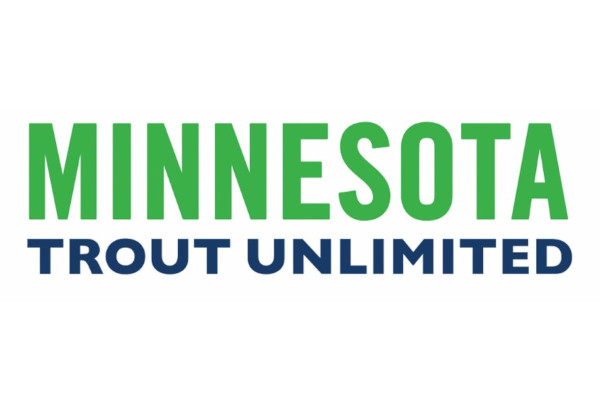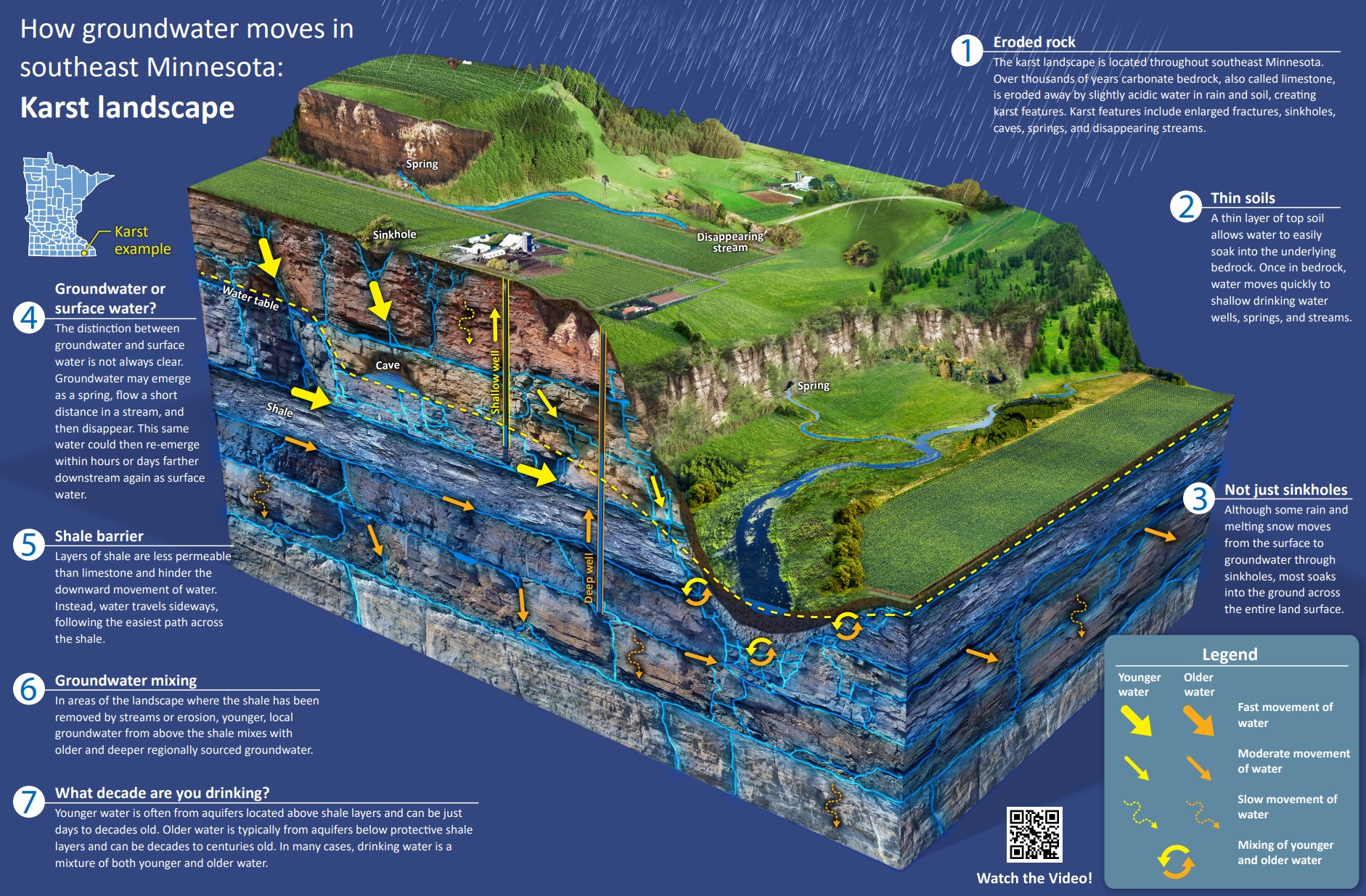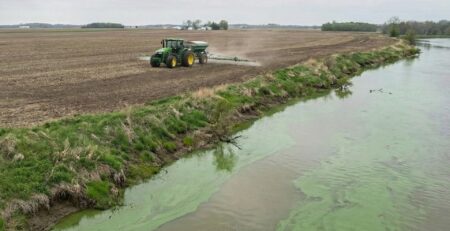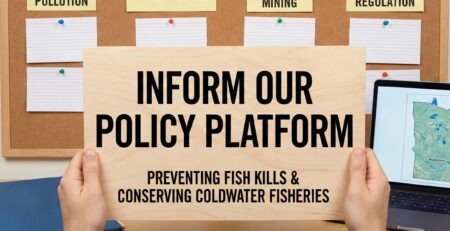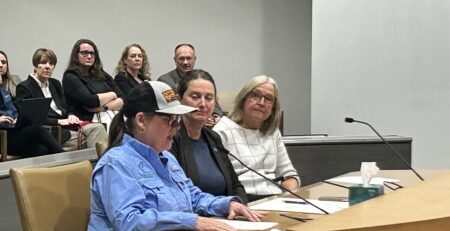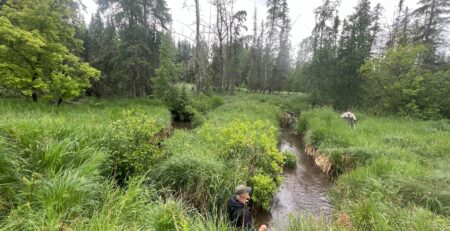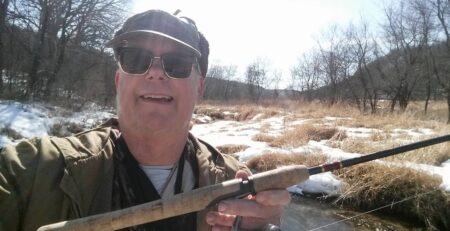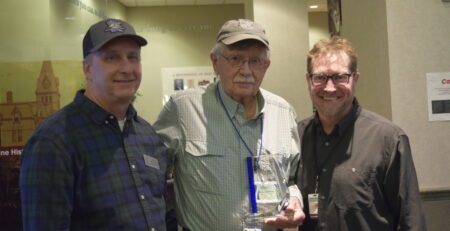Nitrates, Feedlots, and Fish Kills: MNTU Pushes for Stronger Feedlot Rules
MNTU has a long history of developing awareness of, and urging action to reduce, nitrate contamination, especially where contamination impacts Minnesota’s trout streams (see timeline). Regulating nitrates in Minnesota, especially southeast Minnesota, is critical to protect the region’s coldwater fisheries, including brook, brown, and rainbow trout. These streams, predominantly fed by groundwater through sensitive karst geology, are highly vulnerable to nitrate contamination from feedlot practices. Elevated nitrate levels can degrade water quality, reduce dissolved oxygen, and alter habitat conditions, threatening fish survival and reproduction.
Minnesota’s feedlot regulations encompass both overarching rules and specific permits, each serving distinct purposes in managing livestock operations. Generally a part of the revision process of rules, permits and other processes for state agencies is a time period for community input or comments. Minnesota Trout Unlimited recently submitted comments to strengthen Minnesota’s General Feedlot Permits. In May of 2025 the Minnesota Pollution Control Agency opened a comment period for Minnesota’s Animal Feedlots Rule specifically “to amend existing feedlot rules to improve land application of manure practices to address nitrate and fish kills, establish additional technical standards to protect water quality and avoid fish kills.” This comment period will be open until July 22, 2025 and is included as part of phase 3 of the nitrates workplan released by the state agencies in January 2024.
Rules vs. Permits: What’s the difference?
The Minnesota feedlot rule establishes comprehensive standards for the management of all the roughly 24,000 animal feedlots and manure storage facilities in Minnesota. It governs various aspects, including:
•Construction and Operation: Guidelines for the design, location, and operation of feedlots.
•Manure Management: Regulations on storage, transportation, disposal, and land application of animal manure and wastewater processing.
•Environmental Protection: Measures to prevent pollution and protect water quality.
These rules apply broadly to all feedlot operations across the state, ensuring a baseline of environmental and public health protection.
Feedlot permits are issued to regulate individual operations based on their large size and potential environmental impact, in comparison with the feedlot rule which provides general requirements. Feedlots that have 1,000 animal units or more are required to get federal and state permits, making up about 1,200 of the feedlots in the state. The Minnesota Pollution Control Agency (MPCA) administers several types of feedlot permits including National Pollutant Discharge Elimination System (NPDES), State Disposal System (SDS) Permits, Construction Short-Form (CSF) and Interim Permits. These permits include specific conditions tailored to the operation, such as manure management plans, land application requirements, and monitoring protocols.
Key Differences Between Feedlot Rules and Feedlot Permits
Scope:
Feedlot Rule: Applies universally to all feedlot operations, setting general standards.
Feedlot Permits: Apply to some operations only, based on size, location, and environmental impact.
Function:
Feedlot Rule: Establishes baseline requirements for all feedlots.
Feedlot Permits: Impose additional, operation-specific conditions for the largest operations to ensure compliance with environmental standards.
Enforcement:
Feedlot Rule: Violations can lead to enforcement actions applicable to all feedlots.
Feedlot Permits: Non-compliance with permit conditions can result in penalties specific to the permitted operation.
Things to Consider When Making Comments
Minnesota Trout Unlimited (MNTU) will be contributing comments on feedlot rulemaking because of the direct and serious impact that poorly regulated feedlots, especially poor manure application practices, can have on the coldwater streams, rivers, and groundwater that trout depend on. Some specific reasons to comment include:
1. Water Quality Impacts
•Feedlots produce large volumes of manure that can carry a variety of chemicals and nutrients including nitrogen, ammonia, and sediment into nearby waterways.
•Nitrates reduce the size and potentially survival of trout populations and impact the macroinvertebrate populations trout depend on for food.
•Ammonia from manure is directly toxic to fish at even relatively low concentrations and has been tied to recent fish kills in southeast Minnesota.
•Excess nutrients can cause algae blooms that reduce oxygen levels, killing aquatic insects and stressing or killing trout.
2. Groundwater Contamination
•Trout streams depend on clean, cold groundwater.
•Many feedlots are in the southeast Minnesota karst region, where groundwater moves quickly through cracks and sinkholes.
•Nitrate pollution from manure can easily seep into aquifers, threatening groundwater-fed trout streams.
3. Habitat Degradation
•Poor manure management can cause erosion and sedimentation in rivers and streams.
•Sediment covers up the gravel beds trout need for spawning and reduces aquatic insect populations which are the base of the trout food chain.
4. Rulemaking is an Important Opportunity
•Feedlot rule updates can strengthen protections or weaken them. It’s important for all stakeholders to contribute their comments to ensure all concerns are addressed.
•Without groups like MNTU weighing in, the final rules could prioritize industry interests over science-based decision making and clean water, leaving coldwater ecosystems vulnerable.
Developing Our Comments
Minnesota Trout Unlimited will develop its comments over the next month and will make them available to members to consider and incorporate into their own comments. The MPCA has laid out a set of questions to guide comment development which includes the question, what specific changes to the current rules would provide improved regulations that prevent nitrate contamination to ground and surface waters and fish kills? To answer this and other questions, MNTU is analyzing the Rule for whether it ensures that manure on a feedlot or manure storage area does not run into groundwater or streams and whether it will guarantee manure is applied to cropland at a rate, time and method that prevents nutrients from entering streams, lakes and groundwater.
In 2014, the U.S. EPA reported that of the 18,000 feedlots registered with the Minnesota Pollution Control Agency, about 60% housed between 50 and 299 animal units, and thus were not required to develop manure management plans. While a single feedlot’s impact may not be that large, the cumulative impact of numerous small feedlots is huge. MNTU will recommend the Rule change to require all feedlots to develop manure management plans.
The number of large Concentrated Animal Feeding Operations (CAFOs) has increased from 468 to 1497 since 1991, and these operations are also getting bigger. According to a recent report from the Environmental Working Group, there are “23,725 current active feedlots in Minnesota, housing more than 80 million animals, producing an estimated 49 million tons of manure and 234,000 tons of nitrogen each year that go on surrounding fields (ewg.org) We also know that 70% of the state’s nitrate pollution is from cropland and that nitrate levels are particularly elevated in the southern third of the state in the sensitive Karst region. (MPCA, 2013) This is concerning especially in the context of recent research that shows that “legacy…nitrate, has likely not fully migrated through aquifer systems and that concentrations in certain springs, streams, and wells with older water will continue to increase until an equilibrium has been reached with current and historical land use (Kuehner, et.al., 2025).” The Animal Feedlots Rule must look more closely at density and the maximum number animals allowed in a particular watershed, with consideration to the vulnerable groundwater areas of the state including the Karst region.
MNTU will develop specific comments regarding the need for all operations to have plans and for density of operations to be factored and post our final comments at mntu.org/feedlots by mid-July 2025. We will also emphasize that any major changes should come with support for farmers. The MPCA should ensure that there is training and financial support for farmers who invest time and money to make beneficial changes to their practice, and increased agency staffing for greater education and enforcement.
You are invited to join us for a virtual session to discuss the Feedlot Rule and write your own comments with MNTU staff. More information here
Information from the MPCA
We encourage you to attend a public information session in your area! The comment period for this rulemaking is open until Tuesday July 22, 2025, at 4:30 p.m.
Watch the recording of the virtual webinar held on May 19th and/or an in-person information session held throughout the state in June to provide the context necessary to make informed comments on the proposed rulemaking.
In-person public information sessions will be held throughout the state in June. Written comments can be submitted at these meetings, as well as afterwards.
June 3 — Hinckley (9:30- 11:30 a.m.) — Little Falls (1:30-3:30 p.m.)
June 4 — Morris (9-11 a.m.) — Detroit Lakes (2-4 p.m.)
June 5 — Thief River Falls (9:30- 11:30 a.m.) — Bemidji (2-4 p.m.)
June 17 — Paynesville (2-4 p.m.)
June 18 — Marshall (9:30- 11:30 a.m.) — Worthington (2-4 p.m.)
June 24 — New Ulm (9:30- 11:30 a.m.) — Albert Lea (2:30-4:30 p.m.)
June 26 — Chatfield (9:30- 11:30 a.m.) — Zumbrota (2:30-4:30 p.m.)
The address for each public information session can be found by visiting the MPCA’s events and meetings webpage.
https://www.pca.state.mn.us/events-and-meetings?combine=feedlots#events
Comments must be submitted in writing to the Office of Administrative Hearings (OAH) via the rulemaking e-Comments website at https://minnesotaoah.granicusideas.com/discussions
Alternatively, comments may be submitted via U.S. mail to:
OAH attn: William Moore, OAH
600 N Robert St. PO Box 64620
St. Paul, MN 55164-0620
